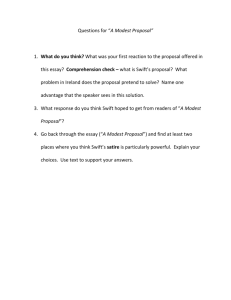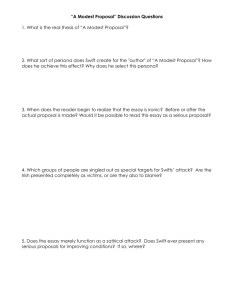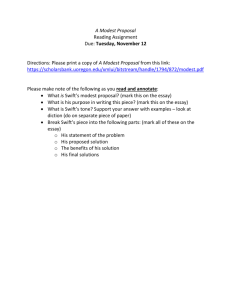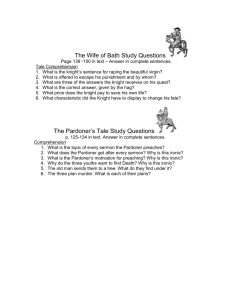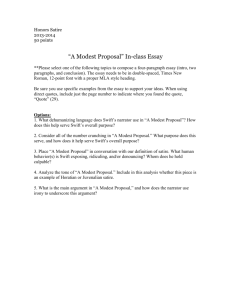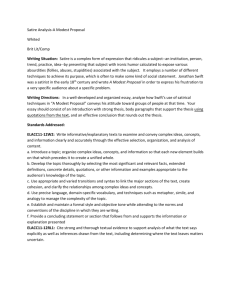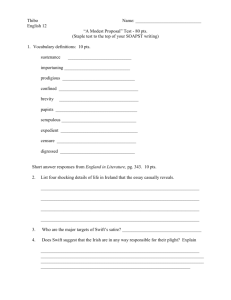“A Modest Proposal” by Jonathan Swift
advertisement
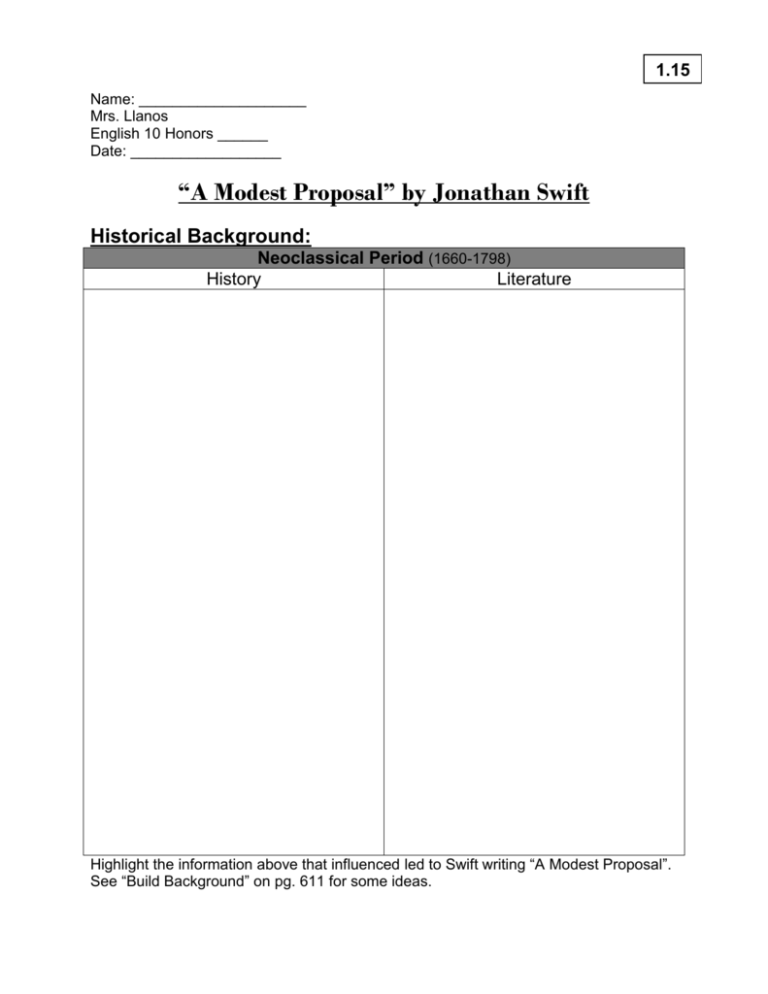
1.15 Name: ____________________ Mrs. Llanos English 10 Honors ______ Date: __________________ “A Modest Proposal” by Jonathan Swift Historical Background: Neoclassical Period (1660-1798) History Literature Highlight the information above that influenced led to Swift writing “A Modest Proposal”. See “Build Background” on pg. 611 for some ideas. Author Background: I. Early Life II. Satire & Politics III. Irish Patriot IV. Literary Contributions V. The Satirist “A Modest Proposal” Outline I. Introduction: Topic & Thesis A. Problem:____________________________________________________________ B. Relevance 1. _____________________________________________________________ 2. _____________________________________________________________ C. Transition to Proposal: ________________________________________________ D. Satirical Thesis: _____________________________________________________ ___________________________________________________________________ II. Body Paragraphs A. Logistics: How will the proposal be implemented? 1. Selection: _____________________________________________________ 2. Customers: ____________________________________________________ 3. Quantity: ______________________________________________________ B. “Positives” of the Proposal 1. Supply: _______________________________________________________ 2. Relationships: _________________________________________________ 3. Profit: ________________________________________________________ 4. Alternative Uses: _______________________________________________ 5. Jobs: ________________________________________________________ C. Swift’s Digression from the Topic: ________________________________________ ___________________________________________________________________ ___________________________________________________________________ D. “Positives” of the Proposal (continued) 1. Overpopulation: ________________________________________________ 2. Economic Gain: ________________________________________________ 3. Monetary Circulation: ____________________________________________ 4. Child Rearing: _________________________________________________ 5. Restaurants: ___________________________________________________ 6. Familial Relationships: ___________________________________________ _____________________________________________________________ 7. Misc: _________________________________________________________ _____________________________________________________________ E. Refutation of Criticism 1. Less logical proposals: ___________________________________________ _____________________________________________________________ 2. Others may not refute this “modest” proposal until _____________________ _____________________________________________________________ III. Conclusion A. Call to Action: ________________________________________________________ ___________________________________________________________________ 1. Problem #1: ___________________________________________________ 2. Problem #2: ___________________________________________________ B. Summary of Previous Problems: _________________________________________ ___________________________________________________________________ ___________________________________________________________________ C. Statement of Altruism: _________________________________________________ ___________________________________________________________________ ___________________________________________________________________ Truth Revealed Directions: Find three ironic statements in “A Modest Proposal” that reveal important facts about Ireland’s condition in Swift’s time. Use the graphs below to record your ideas about the truth revealed in each quote. An example has been provided to guide you. Ironic Statement Ironic Statement “I am assured by our merchants that a boy or girl before twelve years old is no salable commodity” (Swift 615) Truth Revealed Truth Revealed Irish children are not seen as human beings but as worthless objects. Ironic Statement Ironic Statement Truth Revealed Truth Revealed Nonfiction Analysis: “A Modest Proposal” 1. Describe the speaker of the essay. 2. What is the purpose of the essay? 3. Who is the audience of the essay? 4. What is the speaker’s tone? Provide at least three quotes to support your choice. Tone: _________________________________ Evidence: A. ___________________________________________________________ ___________________________________________________________ B. ___________________________________________________________ ___________________________________________________________ C. ___________________________________________________________ ___________________________________________________________ 5. What is Swift implicitly proposing as the literal thesis to the essay? (not his outlandish proposal) Characteristics of Satire in “A Modest Proposal” Directions: For each characteristic of the satire genre, quote at least two examples from “A Modest Proposal” that illustrate the characteristic. Don’t forget to use parenthetical citations! Characteristic the use of persona shocking & disturbing diction ironic statements & situations understatements Example(s) Name: ________________________________ Date: ____________ Block: _______ Socratic Seminar Preparation: “A Modest Proposal” Directions: Before you come to a Socratic Seminar class, please read the seminar guidelines and write at least one question in each of the following categories (be sure to note where in the text you think the question will be most relevant). 1. World Connection Question. Write a question connecting the text to the real world. Example: After reading “The Pardoner’s Tale,” what examples of greed can you think of from modern society? How are they similar and different from the Pardoner’s actions? Would someone like the Pardoner be able to effectively manipulate the “modern man”? My Question: _______________________________________________________________________________ __________________________________________________________________________________________ 2. Close-ended Question. Write a question about the text that will help everyone in the class come to an agreement about events or characters in the text. This question usually has a “correct” answer. Example: At the end of “The Pardoner’s Tale,” why does the Pardoner ask for money? Why is he effective at getting money from the pilgrims? My Question: _______________________________________________________________________________ __________________________________________________________________________________________ 3. Open-ended Question. Write an insightful question about the text that will require proof and group discussion and “construction of logic” to discover or explore the answer to the question. Example: How does “The Pardoner’s Tale” tie to the characteristics commonly associated with Medieval era literature? My Question: _______________________________________________________________________________ __________________________________________________________________________________________ 4. Universal Theme/Core Question. Write a question dealing with a theme(s) of the text that will encourage group discussion about the universality of the text. Example: How is Chaucer commenting on the Church through this ironic, narrative poem? What is his opinion of the Church’s leaders? Why? My Question: _______________________________________________________________________________ __________________________________________________________________________________________ 5. Literary Analysis Question. Write a question dealing with HOW an author chose to compose a literary piece. How did the author manipulate point of view, characterization, poetic form, sentence structure, for example? Example: How is irony used in “The Pardoner’s Tale” to effectively convey the moral of the tale to the pilgrims? My Question: _______________________________________________________________________________ __________________________________________________________________________________________ Additional Questions (choose any of the question types from above): (This part is not optional!) 1. ___________________________________________________________________________________ ___________________________________________________________________________________ 2. ___________________________________________________________________________________ ___________________________________________________________________________________ 3. ___________________________________________________________________________________ ___________________________________________________________________________________
